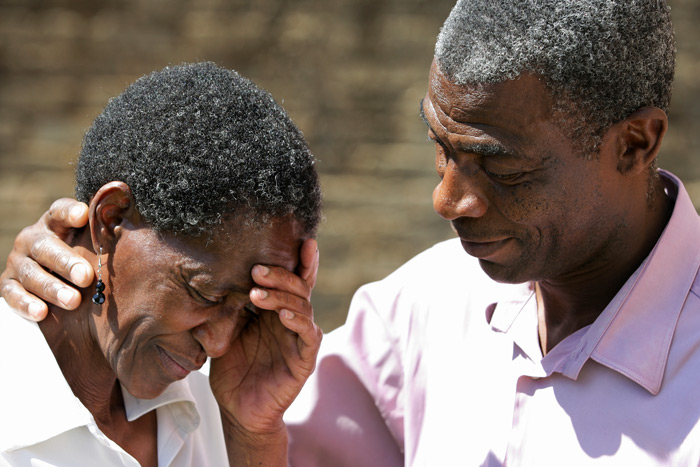The views expressed in our content reflect individual perspectives and do not represent the authoritative views of the Baha'i Faith.
A few years ago, an ultra-Orthodox rabbi caused outrage when he claimed that the Holocaust was God’s punishment for the many sins of the Jewish people.
According to this rabbi, the Holocaust was a divine intervention that punished six million Jews, including 1.5 million children. From this perspective, Hitler would have been an “angel of death,” a puppet in the hands of God, certainly not responsible for his acts.
Personally, I don’t believe in a vengeful, angry God who acts as kind of a great blackmailer in the sky, who threatens us constantly: “If you misbehave, I will punish you!”
Similarly, I find it hard to understand people who see all their problems, difficulties and pains as divine tests: My car broke… It’s a test. I have flu… It’s a test! I am jobless… It’s a test. God is testing me constantly…
When you’re tested, you face an evaluation of your qualities. A test presumes the existence of a tester. I find it very hard to believe in a God that would constantly intervene in each individual life in creation, creating sometimes insurmountable obstacles to His creatures, and then evaluating them on the outcome. To me, a much bigger separation exists between the creation and the Creator. And isn’t randomness a function of creation? Aren’t difficulties a normal part of life?
But do we each face situations where suffering and pain can be described as a “test”? Yes—in fact, many places in the Baha’i scriptures describe suffering as a “test” or a “trial”:
But for the tribulations which are sustained in Thy path, how could Thy true lovers be recognized; and were it not for the trials which are borne for love of Thee, how could the station of such as yearn for Thee be revealed? – Baha’u’llah, Prayers and Meditations, p. 95.
The winds of tests are powerless to hold back them that enjoy near access to Thee from setting their faces towards the horizon of Thy glory, and the tempests of trials must fail to draw away and hinder such as are wholly devoted to Thy will from approaching Thy court. – ibid, p. 3.
O Thou Whose tests are a healing medicine to such as are nigh unto Thee, Whose sword is the ardent desire of all them that love Thee, Whose dart is the dearest wish of those hearts that yearn after Thee, Whose decree is the sole hope of them that have recognized Thy truth! – ibid, p. 220.
Baha’u’llah addresses each of these phrases specifically to the Baha’is, referred to as “Thy true lovers”, “such as yearn for Thee”, “all them who are devoted to Thy will”, “them that enjoy near access to Thee” and “all them that love Thee.” Not addressed to humanity as a whole, they speak to only those who believe in Baha’u’llah’s revelation.
In these prayers and meditations from Baha’u’llah, suffering is presented as a natural consequence of an act of faith: the acceptance of Baha’u’llah as a prophet, messenger and manifestation of God. Accepting a new Faith can create difficult situations for believers. Such occurrences go from being the target of jokes or pressures, to being discriminated against, openly harassed, or in some places, actively persecuted. These situations don’t necessarily represent a direct interference of God in the world of creation, but instead come directly as the consequence of an expression of faith. These real “tests” and “trials” challenge the faith of the believers.
 So not all suffering can be understood as a test for the one who suffers. Abdu’l-Baha never used words like “trial” or “test” when he wrote to the mother who lost a son, or when he referred to the earthquake in San Francisco. To do so would have meant minimizing their suffering, or even implying that they needed to just overcome their difficulties—which the Baha’i teachings never do.
So not all suffering can be understood as a test for the one who suffers. Abdu’l-Baha never used words like “trial” or “test” when he wrote to the mother who lost a son, or when he referred to the earthquake in San Francisco. To do so would have meant minimizing their suffering, or even implying that they needed to just overcome their difficulties—which the Baha’i teachings never do.
But could we consider all the suffering that occurs outside the scope of faith a test? Could someone’s else’s problems or even a natural calamity be considered a test? Yes, it could—and not just for the victims. In the global village we live in today, any news of tragedy or disaster, whether natural or manmade, typically spreads rapidly and raises sympathy and support. In practice, such suffering ceases to be unknown to us, and it becomes a test of our own individual kindness, solidarity and compassion.
It seems obvious that we can make constructive use of tragedies if we consider the suffering of others as our own spiritual test. It can help us find ways to spread the “spirit of world solidarity” to all continents, and actively contribute to a more united world.
In response to the pain and suffering that befalls others, Baha’u’llah encourages us to:
Be as a lamp unto them that walk in darkness, a joy to the sorrowful, a sea for the thirsty, a haven for the distressed, an upholder and defender of the victim of oppression. …an answerer of the cry of the needy, …a joy to the sorrowful, … a balm to the suffering, a tower of strength for the fugitive…” – Gleanings from the Writings of Baha’u’llah, p. 284.
You May Also Like
Comments

















(Shoghi Effendi, The Promised Day is Come, p. 112)
Abdul-Baha says that this question of suffering is immensely deep which seems to imply i m o that I'll never uncover all that's involved.
Marco, it seems to me from the depth of your learned thinking on this subject that ...you might have a book in mind specifically concerning the question of suffering. I'd love to read it, if such exists or will exist, because a book gives scope to commenting in depth as to the obstacles you say we can't overcome in comparison with my understanding of the Baha'i position that no one will be tested beyond his means. (Mutatis mutandis vis-a-vis the masculine gender pronominal)
Marco; 'creating sometimes insurmountable obstacles to His creatures,'
I can accept for example that I will not be tested beyond my means despite my opinion to the contrary while suffering horrendous migraines for decades and yet in a sense I never surmounted those migraines for they simply vanished as I aged. Interpretation and attitude are the keys
How for example do you understand, Marco, the 3 phrases from Baha'u'llah's pen addressing 'trials' and 'tribulations' in life vis-a-vis tribulations undergone by seekers, Christians, Muslims etc juxtaposed a little later with your: 'Not addressed to humanity as a whole, they speak to only those who believe in Baha’u’llah’s revelation.'
I'm inclined to believe that God and the Holy Spirit are closer to me than my life vein, that They know and understand what I'm thinking before I've thought it and that every test and difficulty of every moment of the day is known to Them and has a purpose which is often so deep that it's not possible to fathom - perhaps for decades or perhaps until after death.
From the third Ishraq: "...the canopy of world order is upraised upon the two pillars of reward and punishment.”
"Be unrestrained as the wind, while carrying the Message of Him Who hath caused the Dawn of Divine Guidance to break. Consider, how the wind, faithful to that which God hath ordained, bloweth upon all the regions of the earth, be they inhabited or desolate. Neither the sight of desolation, nor the evidences of prosperity, can either pain or please it. It bloweth in every direction, as bidden by its Creator. So should be every one that claimeth to be a lover of the one true God. It behoveth him to fix his gaze upon the fundamentals of His Faith, and to labor diligently for its propagation. Wholly for the sake of God he should proclaim His Message, and with that same spirit accept whatever response his words may evoke in his hearer. He who shall accept and believe, shall receive his reward; and he who shall turn away, shall receive none other than his own punishment. ..."
Gleanings of Baha'u'llah
Baha'i love
Paul
Personally, my awful physical sufferings pale into insignificance compared with the Baha'is in name who defrauded me and bankrupted the successful company which I founded as a company director and as a result for two decades I have lived in and continue to live in straitened circumstances
The greatest tests for Baha'is will come from other Baha'is
'Advance into poverty...' Baha'u'llah says and he's fully right for now I am no longer in the rat race or time poor.
And further, all of the above pain at the time is ...as nothing compared with tragedies closer to home which I don't air except to God
But you see these apparent set backs which appeared to be insurmountable obstacles actually prepared the path for me to write several books which I will soon publish concurrently - Inshallah. These trials set me up to have the mind set and the time to write, i.e. a task I would never had undertaken had I continued on my 'happy' way in business and in good physical health
Just as we can't assess the measure of the talents bestowed by God on each individual we also can't fully assess each person's tests or reactions. This is why I say pray for them, help them and leave them to God
What seems clear to me in the Writings whether Baha'u'llah is addressing Babis or others is that His explanation applies to all people. Though He addressed Babis the Tablet's content is not necessarily limited to them
Marco: “God hath never burdened any soul beyond its power”. But this text is addressed to the Babis who do not recognize Baha’u’llah as a Manifestation of God"
Otherwise, Marco, He would have said something like: "God hath never burdened any of you Babis...." or "God hath never burdened believers in the Book" or something of that ilk
He whose words were never revealed to confuse us wrote: "God hath never burdened any soul beyond its power."
Consider airing another insurmountable obstacle in the interests of true consultation
Baha'i love
Paul
Thanks for your comment!
Theodicy is a complex and never ending subject. The Master told us that the explanation of the subject is difficult. The questions are many and the personal answers we may get are temporary. I doubt we will ever achieve final answers on this issue. I remember these words from Baha’u’llah:
How great the multitude of truths which the garment of words can never contain! How vast the number of such verities as no expression can adequately describe, whose significance can never be unfolded, and to which not even the remotest allusions can be made! ...How manifold are the truths which must remain unuttered until the appointed time is come! Even as it hath been said: “Not everything that a man knoweth can be disclosed, nor can everything that he can disclose be regarded as timely, nor can every timely utterance be considered as suited to the capacity of those who hear it.” (Gleanings, LXXXIX)
My articles are just the result of personal experience and personal reflection. I am only sharing my views. I don’t know if I will ever write a book on this subject. Who knows?...
I know many Baha’is who believe that Bahá’u’lláh said that God never tests a soul beyond his/her capacity.
In fact in Gleanings LII we can read: “God hath never burdened any soul beyond its power”. But this text is addressed to the Babis who do not recognize Baha’u’llah as a Manifestation of God. Such recognition is a test for every human being. And Baha’u’llah says that this specific test is not beyond the capacity of any soul.
Difficulties and obstacles are part of life. Some people have a positive attitude, overcome these difficulties and become stronger. I saw this with my mother when she faced breast-cancer. Other people have a negative attitude, feel powerless to overcome certain difficulties and feel down and depressed.
I believe that randomness is also part of life; i m o, that means that not everything has to have a purpose.
I don’t believe that my mother’s disease was a divine test or fate. Randomness and genetics played their role. Of course I read several times the healing prayer for her (I also believe that God and the Holy Spirit are closer to us than we can ever imagine). She was lucky to be treated by good doctors, and today my sisters and I are happy that she survived and is still alive with us.
My mother’s attitude had another consequence: it kept us even more united as a family. But that was a consequence. I don’t believe that such consequence was a divine purpose.
But I also believe that she is facing a divine test: to recognize Baha’u’llah as Manifestation of God.
Warmest greetings,
Marco